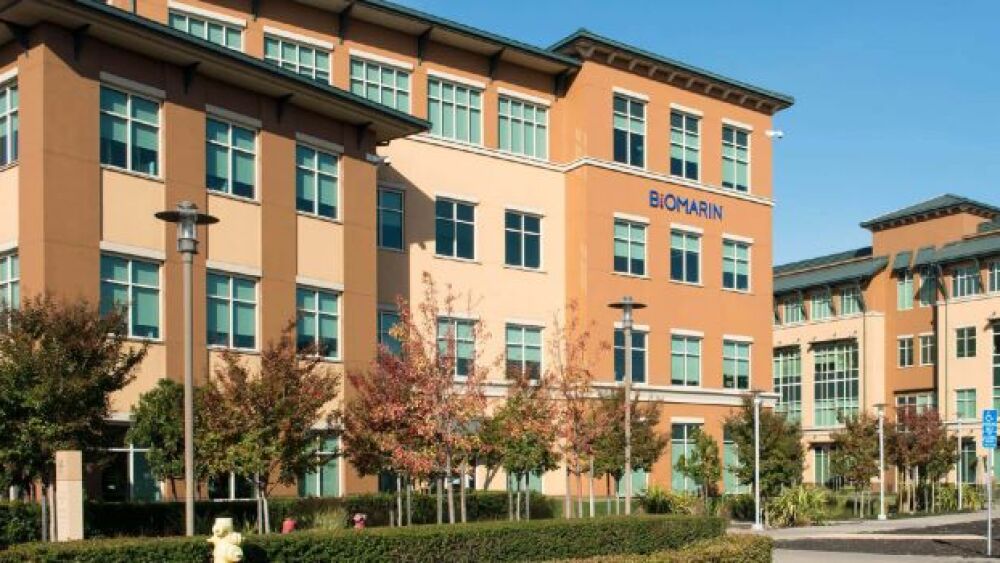Two years after receiving a Complete Response Letter for its hemophilia gene therapy, BioMarin is heading back to the FDA with stronger and more robust data for potential approval.
BioMarin HQ/courtesy of BioMarin
Two years after receiving a Complete Response Letter for its hemophilia gene therapy, BioMarin is heading back to the FDA with stronger and more robust data for potential approval.
California-based BioMarin resubmitted a Biologics License Application for valoctocogene roxaparvovec, a potential one-time gene therapy treatment for severe hemophilia A. If approved, it would mark the first gene therapy in the United States for the treatment of this disease. The gene therapy was authorized for use in Europe in August under the brand name Roctavian.
BioMarin’s resubmitted BLA contains two-year outcomes from the Phase III GENEr8-1 study, as well as supportive data from five years of follow-up from the ongoing Phase I/II dose escalation study.
Debra Charlesworth, vice president of corporate communications at BioMarin, told BioSpace the company will likely find out by the end of October if the BLA has been accepted. From there, the review time is estimated at about six months but could be extended by an additional three months due to additional data read-outs that are expected during the review period.
The Supporting Evidence
The data resubmission includes two-year outcomes from the GENEr8-1 trial that showed treatment with valoctocogene roxaparvovec offered what the company called “stable and durable bleed control.” Additionally, the therapy provided patients with a reduction in mean annualized bleeding rate and mean annualized Factor VIII infusion rate, according to the company.
The more robust data package also includes supportive evidence from five years of follow-up from the 6e13 vg/kg dose cohort in the ongoing Phase I/II dose escalation study of patients with pre-existing AAV5 antibodies, Charlesworth noted.
“There is just a lot more data supporting this resubmission,” she said.
BioMarin’s initial BLA submission was based on interim data from a subset of patients in the initial trial. The FDA determined the gene therapy was not ready at the time for review and issued the CRL. Earlier this year, the regulator reiterated its call for additional data that could support a BLA. The FDA wanted to see additional data regarding the durability of the therapy’s effect on patients and its safety profile.
People who have hemophilia A lack the Factor VII protein that aids in the clotting of blood. Without Factor VIII, hemophilia A patients are at risk for painful or life-threatening bleeding from injuries.
Valoctocogene Roxaparvovec delivers a functional gene into the patient, which is designed to enable the body to produce Factor VIII on its own. This is expected to allow people to cease relying on continued hemophilia prophylaxis.
Last year, the FDA granted the gene therapy Regenerative Medicine Advanced Therapy designation. It also holds Breakthrough Therapy and Orphan Drug designations.
In its resubmission, BioMarin also proposed a long-term extension study following all clinical trial participants for up to 15 years, as well as two post-approval registry studies.
Other Targets and Assets
BioMarin continues to assess valoctocogene roxaparvovec in multiple studies, including a Phase I/II trial in patients with hemophilia A with active or prior Factor VIII inhibitors. The company is also conducting a Phase III, single-arm open label study assessing the gene therapy at a dose of 6e13 vg/kg with prophylactic corticosteroids in people with severe hemophilia A.
Beyond hemophilia, BioMarin is focused on other upcoming milestones in its Duchenne Muscular Dystrophy program. The company anticipates seeking authorization to begin clinical testing of BMN 351, an antisense oligonucleotide therapy for individuals with exon 51-skip-amenable DMD.
An Investigational New Drug application is expected within the next several months. Preclinical data suggest that “restored expression of near-full-length dystrophin protein at levels of up to 40% will convert phenotypes from rapid loss to durable preservation of strength and ambulation,” according to the company.
BioMarin also plans to file an IND for two other investigational assets next year. Plans include potential studies of BMN 349 for alpha-1 antitrypsin deficiency and BMN 293 for MYBPC3 hypertrophic cardiomyopathy.





